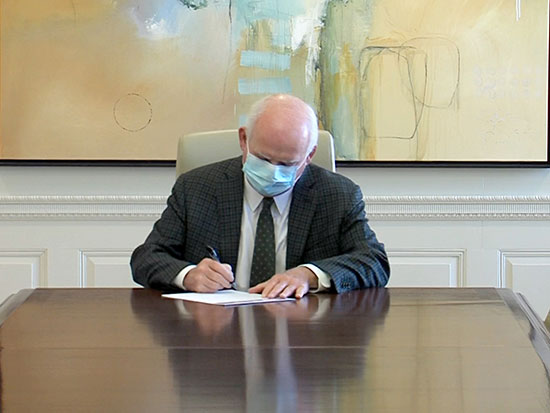 President Ray L. Watts signs the Okanagan Charter, making UAB the first university in the United States to adopt it and become an internationally recognized Health Promoting University. The University of Alabama at Birmingham is the first university in the United States to adopt the Okanagan Charter and become an internationally recognized Health Promoting University.
President Ray L. Watts signs the Okanagan Charter, making UAB the first university in the United States to adopt it and become an internationally recognized Health Promoting University. The University of Alabama at Birmingham is the first university in the United States to adopt the Okanagan Charter and become an internationally recognized Health Promoting University.
Health Promoting Universities are an international community that aspires to transform the health and sustainability of current and future societies, strengthen communities, and contribute to the well-being of people, places and the planet.
The International Health Promoting Campuses Network is guided by the Okanagan Charter, which calls on postsecondary schools to infuse health into campus culture and lead health promotion action and collaboration locally and globally. Created in June 2015, the charter provides institutions with a common language, principles and framework to become health-promoting campuses with cultures of compassion, well-being and equity.
Each HPU develops its own strategic plan for how it lives out and implements health promotion on its campus and in its community. By doing so, health-promoting universities and colleges improve the health of the people who live, learn, work and play on their campuses and strengthen the ecological, social and economic sustainability of their communities and wider society.
UAB has always been a university that is focused on improving health and well-being, says President Ray L. Watts.
“Adopting the charter aligns who we have always been as an institution with an internationally known framework and network, and UAB will lead the nation as the network chair of U.S. HPUs,” Watts said. “It will raise UAB’s visibility internationally, nationally and statewide for our work in health and health promotion.”
UAB already has many active initiatives and programs that fit within the ideological framework of the charter, including:
- Live HealthSmart Alabama and the Grand Challenge
- Exercise is Medicine
- Signature Core Curriculum
- Birmingham Health District and Tobacco Free Campus
- Diversity Education and other Diversity, Equity and Inclusion programming
- Sustainability
- UAB Cares Suicide Prevention and Intervention Initiative
According to the charter, higher education plays a central role in all aspects of the development of individuals, communities, societies and cultures — locally and globally.
UAB’s vision and mission perfectly align with the Okanagan Charter, says Assistant Vice President for Student Health and Wellbeing Rebecca Kennedy, Ph.D., who is U.S. Health Promoting Campuses Network Executive Committee chair.
“The Okanagan Charter outlines two calls to action, both of which UAB is already actively engaged in,” said Kennedy, who also serves as a steering group member for International Health Promoting Universities and Colleges. “As leaders in health care, we understand that the mere absence of disease in an individual does not necessarily indicate a climate of well-being for all. Creating a climate for health and well-being is an active process dependent on all of us to recognize we are interconnected as people and require a healthy, sustainable environment to thrive in.”
In an international study of 54 Health Promoting Universities, the most common priority areas of action were skills for health and well-being, support for research and postgraduate training in health promotion, healthy work and study environments, health in policies and curriculum, and reorientation of primary health care to an integral approach, promoting physical, psychological and emotional well-being.
UAB already addresses numerous areas of health promotion, including physical activity and sport, eating habits, alcohol abuse prevention, sexual health, policies to promote equity and inclusion, drug abuse prevention, mental health, and smoking cessation, among others.
Formalizing a commitment to translate the Okanagan Charter into action is an enormously important signal of a university’s commitment, says Matt Dolf, Ph.D., director of UBC Wellbeing at the University of British Columbia and chair of the Canadian Health Promoting Campuses Network.
“The Charter has been taken up worldwide as a common agenda and call to action for higher education,” Dolf said. “As the principles in the charter state, universities have a unique ability to take on societal and planetary challenges in new ways that are evidence-based, collaborative and community-led. I congratulate UAB for taking a leadership position in advancing the health-promotion agenda on its campus and beyond.”
Professor Mark Dooris, chair of the International Health Promoting Universities and Colleges Steering Group and co-chair of the UK Healthy Universities Network, says he looks forward to working with UAB and the emerging U.S. network “to strengthen this global movement and further mobilize action for change.”